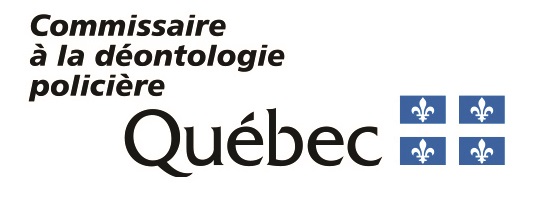File a complaint
Conciliation
Conciliation
What is Conciliation?
The purpose of conciliation is to resolve, through a settlement agreed upon by both parties, the complaint filed against one or more persons subject to the Code of Ethics of Québec Police Officers. Both parties must agree to keep this meeting confidential.
Its purpose is to settle a disagreement or dispute that arises between a complainant and persons subject to the Code of Ethics of Quebec Police Officers (police officers and any other peace officers). During the conciliation meeting, the parties exchange their point of view in order to reach an agreement and thus agree on a settlement that is satisfactory to all.
Decree of a Conciliation
The Police Act states that any complaint must be submitted to conciliation, unless the Commissioner has refused the complaint after his preliminary analysis or the complaint is referred for investigation in the public interest, for example if there is:
- a dead person ;
- serious injuries;
- a potential criminal offence;
- any case of recurrence.
Conciliation may also be ordered following the Commissioner's decision to grant a request for review or, with the agreement of the parties, during or at the end of an investigation.
Conciliation is mandatory for the police officer or any other peace officer targeted by the complaint.
Opposition to Conciliation by the Complainant
If the complainant considers that conciliation is inappropriate in their situation, they may oppose it within 30 days of the filing of their complaint. The Commissioner will assess their reasons.
Then, the Commissioner may:
- decide to order an investigation if he deems valid the reasons for not holding a conciliation meeting;
- reject the reasons and keep the complaint in conciliation;
- decide to reject the complaint following the complainant's refusal to participate in conciliation. This measure is used only as a last resort, after trying to convince the complainant to participate in the conciliation.
The Role of the Conciliator
Once the complaint has been referred to conciliation, a conciliator takes charge of the file.
This person must:
- obtain and maintain the confidence of the parties and, to this end, exercise courtesy, reserve, dignity, integrity and impartiality;
- conduct its work with speed and flexibility;
- ensure that the proceedings of the session are kept in good order and remain calm;
- avoid pressuring a party to agree to a settlement;
- suspend or terminate the session, after notice to the parties, when:
- the good order of the session is compromised;
- the continuation is likely to be detrimental to a party;
- the conclusion of an agreement appears illusory;
- a reason of public interest requires the appointment of the Commissioner.
- avoid interfering in a dispute that is within the jurisdiction of an administrative, civil, criminal or criminal court;
- ensure the confidentiality of the exchanges that took place during the conciliation work.
Planning and Conduct of a Conciliation Meeting
The conciliator sees to the organization and holding of the conciliation meeting within 45 days. This period may be extended if necessary, following a formal request and for justifiable reasons under the Police Act.
Following the analysis of the complaint, this person determines, taking into account the schedule of the persons concerned, a date, a time and a place that suits everyone. If all parties agree, the conciliation could also be held in virtual mode, with the use of the Teams application. A written notice of meeting is sent to confirm the holding of the meeting.
The conciliation session is held in the presence of the parties. The persons targeted by the complaint should not attend in uniform. During the session, the complainant and the persons concerned by the complaint may be accompanied by a person of their choice.
The meeting allows the parties to express their point of view frankly and freely.
The Settlement or the Failure of a Conciliation Meeting
Conciliation requires the active participation of all parties. In good faith, with the support of the conciliator, the parties discuss to try to settle their disagreement. If the parties agree together, a written settlement will be signed by all.
If the conciliator puts an end to a conciliation session or finds that the parties are unable to reach an agreement, a report is submitted to the Commissioner. The latter proceeds to an analysis of the complaint and decides to order an investigation or to reject the complaint.
The conciliation settlement leads to the closure of the police ethics complaint. The law provides that the complaint is then deemed to be withdrawn.
The personal file of the peace officer concerned will not contain any mention of the complaint or the conciliation settlement. However, we must maintain the registration of this complaint in our register.
A settlement in conciliation is not an admission of guilt by either party. In order to promote a climate of understanding conducive to frank discussions, the law guarantees that the answers or statements of the complainant or of the persons targeted by the complaint cannot be used, nor are they admissible in evidence at the occasion of criminal, civil or administrative proceedings.
<< 1. Preliminary Analysis Communication with the parties involved >>
File a complaint
Need help?
If you want more information or if you need help drafting your complaint, you can contact us.
deontologie-policiere.quebec@msp.gouv.qc.ca
